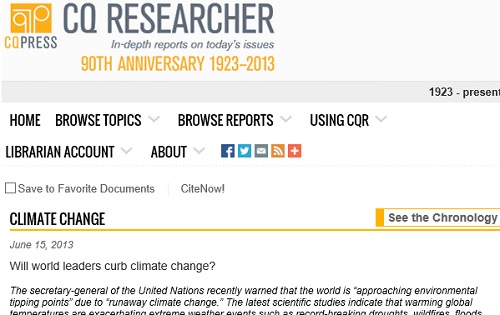This summer, we’ve been exploring what goes into good, academic research. And although there are plenty of great basic skills and techniques usable for any discipline – which we covered in the first week – each subject taught at IU East has its own unique character and needs. Here, we’ll look at the sources for your research in political science.
Like with most other academic topics, there are a number of excellent databases that will give you great research articles – start with a database like ProQuest Political Science or Military and Government. Another great source is CQ Researcher (despite being named ‘Congressional Quarterly, it is produced by journalists, not the US government), which has incisive, deep reports on a variety of hot political topics from gun control and immigration to bullying and racial politics. Each one also includes a chronology briefly describing major events affecting that issue. If your topic is historical, you might try JSTOR or browse or book and ebook collection, as well. All of our political science databases can be found here.
One caveat – in many other disciplines, you have probably searched for ‘peer-reviewed’ journals. You may have heard that these are more rigorous or accurate or scholarly than other articles, and they are: they are examined by other experts in the field – the ‘peers’ of the author – before they are published. A lot of researchers limit their searching to only peer-reviewed articles out of habit. But if you are researching an emerging topic or event going on right now, you definitely do NOT want to limit yourself to peer-reviewed articles. The process of peer-review adds months, at least, to the time it takes to publish an article. So if you want up-to-date information about, for example, the ISIS uprising in Iraq, you need articles that can be published far faster.
So, let’s say we were interested in researching what effect Colorado’s decriminalization of marijuana has had on non-medical uses of the drug. We might put together a search like this:
(marijuana OR pot OR cannib*) AND colorado* AND (criminal* OR legal* OR decriminal*) NOT (medic*)
Note that we are looking for three concepts – marijuana, the state of Colorado, and legality – and excluding another – medicine. The synonyms grouped in parentheses and using wildcards help us find articles that may not use a word we expected, but that is still relevant. If an article only uses the word ‘cannabis’ to refer to marijuana, for instance, we will still find it.
Just blindly typing in ‘colorado marijuana’ will give us a mix of medical and non-medical uses of the drug, and not necessarily look at the effects of its legal status – the article might only be interested in economics, for example. There will be less false hits and more strong ones with our more focused search.
But like all areas of human knowledge, political science has several types of information that require different types of research. Fortunately, we have plenty of material to meet these needs.
PARTISAN ARGUMENTS
For most subjects, objectivity is important. Scholars try, as best as they are able, to minimize or eliminate their own biases from their work. That’s true in political science, as well, to a certain extent. It can be difficult – presumably, you decided to study this field because you were inspired by some political issue, so looking at something so personal objectively can be a daunting task.
But politics is made of people who approach issues very differently – sometimes bitterly so. And studying those interactions and differences of opinion is crucial to the understanding of political science. That’s where Opposing Viewpoints in Context comes in. This database includes information on all the major political issues, including some news and research content – but its main distinction are ‘viewpoint’ articles, written by partisan leaders and clearly and articulately stating the positions and beliefs of each side. These articles make no pretense of being unbiased, but they are an unparalleled source for quickly finding cogent and well-reasoned descriptions of major political viewpoints.
POLITICAL GROUPS
Political alliances are made up of smaller groups, and understanding those groups can be important. How many members are there? What are associated organizations, or their allies – is it an independent or subordinate group? How do you contact them? Do they have tax-exempt status? If so, are donations made to them tax-deductible? How much money do they have? For these questions, databases like Associations Unlimited are excellent resources. You can use this database to research organizations – or, if you are an activist, to join or donate to one.
PENDING LEGISLATION
Recently, we looked at legal and criminal justice research. There is some overlap with political science, too – but political science is also concerned with changing laws, and advocating for passing new laws. This sort of proposed legislation – bills currently being debated in Congress – can be found through the Library of Congress. Just choose “Legislation in Current Congress” and search by keyword, bill name, bill number, sponsor, or even what committee it came out of. You can find out what the legislation is for, the current wording of the proposed bill, which chamber it’s in (House or Senate), who all sponsors or co-sponsors it, current status and amendments, and votes that have been taken. It goes back to the 93rd Congress (1973), allowing you to ‘look behind the curtain’ at how a lot of existing law was made.
With all of these tools at your disposal, you’ll be able to do better and more nuanced research on political science topics. But if you have any questions, please contact us at iueref@iue.edu!



